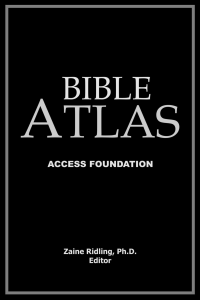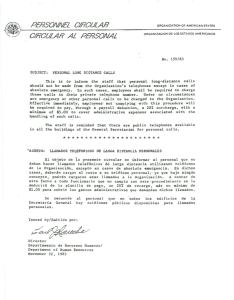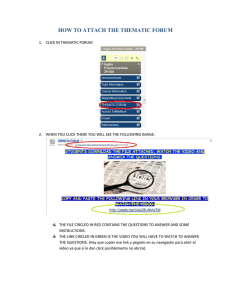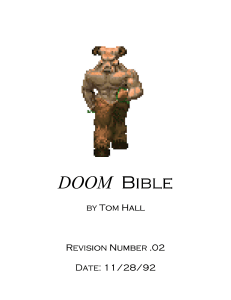Old Testament-Fall - Diocese of Brooklyn
Anuncio
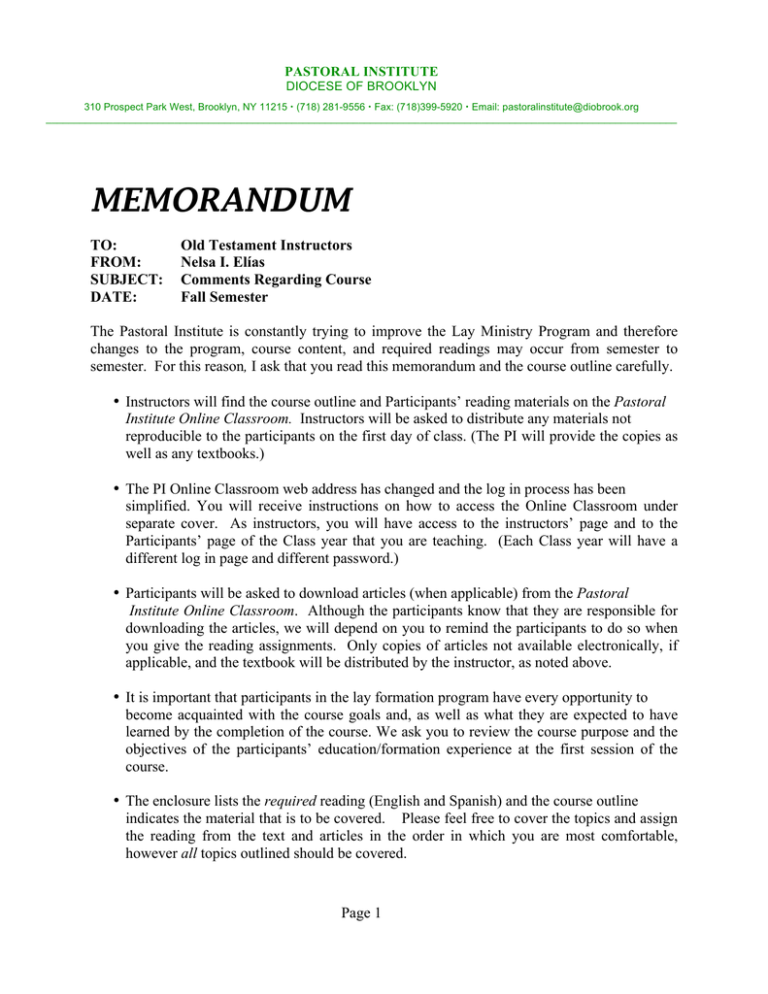
PASTORAL INSTITUTE DIOCESE OF BROOKLYN 310 Prospect Park West, Brooklyn, NY 11215 (718) 281-9556 Fax: (718)399-5920 Email: pastoralinstitute@diobrook.org _________________________________________________________________________________________________________________ MEMORANDUM TO: FROM: SUBJECT: DATE: Old Testament Instructors Nelsa I. Elías Comments Regarding Course Fall Semester The Pastoral Institute is constantly trying to improve the Lay Ministry Program and therefore changes to the program, course content, and required readings may occur from semester to semester. For this reason, I ask that you read this memorandum and the course outline carefully. • Instructors will find the course outline and Participants’ reading materials on the Pastoral Institute Online Classroom. Instructors will be asked to distribute any materials not reproducible to the participants on the first day of class. (The PI will provide the copies as well as any textbooks.) • The PI Online Classroom web address has changed and the log in process has been simplified. You will receive instructions on how to access the Online Classroom under separate cover. As instructors, you will have access to the instructors’ page and to the Participants’ page of the Class year that you are teaching. (Each Class year will have a different log in page and different password.) • Participants will be asked to download articles (when applicable) from the Pastoral Institute Online Classroom. Although the participants know that they are responsible for downloading the articles, we will depend on you to remind the participants to do so when you give the reading assignments. Only copies of articles not available electronically, if applicable, and the textbook will be distributed by the instructor, as noted above. • It is important that participants in the lay formation program have every opportunity to become acquainted with the course goals and, as well as what they are expected to have learned by the completion of the course. We ask you to review the course purpose and the objectives of the participants’ education/formation experience at the first session of the course. • The enclosure lists the required reading (English and Spanish) and the course outline indicates the material that is to be covered. Please feel free to cover the topics and assign the reading from the text and articles in the order in which you are most comfortable, however all topics outlined should be covered. Page 1 • Integration Paper: The Pastoral Institute requires that the instructors only offer the participants a choice of two or three questions/topics from the list at the end of the course outline. This will help us ensure that the theological and intellectual goals of the Pastoral Institute are met. The integration paper is not meant to be solely a report or reflection paper. • When grading integration papers, please follow the Pastoral Institute guidelines and grading conventions. (Refer to the most recent Instructor Handbook.) • The supplemental reading and resource list, if any, will be posted on the PI Online Classroom. Thank you for all your efforts on behalf of the Pastoral Institute. Please let me know if you have any questions regarding this, or any of the course material. Enc. Revised July 2012 Page 2 Pastoral Institute ♦ Diocese of Brooklyn Lay Ministry Program Course Title: Introduction to the Old Testament Yahweh’s Relationship with a People in History Course Length: 12 hours Purpose: This course will present the concepts, themes, documents and tools of interpretation relevant to studying and understanding the bible as a whole. Participants will understand the steadfast love of God who establishes a covenantal relationship with a people in history. Objectives: 1. To present through the use of various resources, especially a study bible, the guidelines for scripture interpretation and critical tools for understanding the bible as encouraged by Divino Afflante Spiritu and Vatican Council II. 2. To present the Exodus event as a journey of faith for the Hebrew people. 3. To highlight the call and role of the prophets in this journey of faith including how this relates to the call to ministry in the present day. 4. To present God’s creation ex nihilo of all things good, as well as the human responsibility for evil. 5. To highlight the lessons to be drawn from the Wisdom literature, especially through the suffering and redemption of Job in the Book of Job. Required Reading: Billon, Gérard y Gruson, Phillippe. Para leer el Antiguo Testamento. Estella, Spain. Editorial Verbo Divino, 2009. Brown, S.S., Raymond E. Responses to 101 Questions on the Bible. New York, NY. Paulist Press, 1990. Questions 21-24. Catechism of the Catholic Church. Part One, Section One, Article 3: Sacred Scripture. (Available in English and Spanish) Dei Verbum: Dogmatic Constitution on Divine Revelation. (Available in English and Spanish) La Bibla Latinoamerica. Editorial Verbo Divino. (Por favor recomiéndeles a los participantes que usen esta versión de la Biblia, ya que es la que preferimos.) Mitchell, Ph.D., Alan C. The Need for Biblical Criticism. Scripture from Scratch. Cincinnati, OH. St. Anthony Messenger Press, 2000. Page 3 Pinter, Brian B. A Fundamental Challenge: Three ways to combat biblical literalism. America Magazine, September 12, 2011. http://www.americamagazine.org/content/article.cfm?article_id=13002 New American Bible, The. Catholic Bible Press. Rohr, Richard and Martos, Joseph. The Great Themes of Scripture: Old Testament. Cincinnati, OH. St. Anthony Messenger Press, 1988. Schneiders, I.H.M., Sandra. Interpreting the Bible: The Right and the Responsibility. Scripture from Scratch. Cincinnati, OH. St. Anthony Messenger Press, 1997. Instructor’s Background Reading: Pius XII. Divino Afflante Spiritu. Outline of the Book of Job, An. Praying with the Psalms. Pope Benedict XVI. Post-Synodal Apostolic Exhortation Verbum Domini September 2010. Especially Part I: The Interpretation Of Sacred Scripture In The Church. http://www.vatican.va/holy_father/benedict_xvi/apost_exhortations/documents/hf_benxvi_exh_20100930_verbum-domini_en.html El Santo Papa Benedicto XVI. Exhortación Apostólica Postsinodal Verbum Domini. Septiembre 2010. Sobre La Palabra de Dios en la Vida y en la Misión de la Iglesia. Especialmente Parte 1: La interpretación de las Sagradas Escrituras en la Iglesia. http://www.vatican.va/holy_father/benedict_xvi/apost_exhortations/documents/hf_benxvi_exh_20100930_verbum-domini_sp.html Page 4 Pastoral Institute ♦ Diocese of Brooklyn Lay Ministry Program Course Title: Introduction to the Old Testament Yahweh’s Relationship with a People in History Course Outline Part I: Overview: The Catholic Approach to Understanding the Bible • The nature and meaning of revelation o What is revelation? o Why is revelation important? o How does God reveal? • The nature and meaning of inspiration and inerrancy o What does it mean to say the Bible is inspired? o What does it mean to say the Bible is inerrant? • The nature and meaning of canonicity • Participant readings o Dei Verbum Chapter I, II, III, IV o Catechism of the Catholic Church, #50-#108 and #120-#123 o La Bibla Latinoamerica and The New American Bible (Old Testament introductory material) o Responses to 101 Questions on the Bible, Questions 21-24. o Selections from Rohr/Martos or Charpentier o Pinter, Brian B. A Fundamental Challenge: Three ways to combat biblical literalism. Part II: Studying the Bible • Various texts, versions, and translations of the Bible o o o o o Septuagint Masoretic text Codices Vulgate Survey of Bible translations in English/Spanish Page 1 • Critical approaches to the bible (with particular emphasis on the historical-critical method) o o o o o o Historical criticism Textual criticism Literary criticism Form criticism Redaction criticism Other critical approaches • Interpreting the Bible o How do Catholics interpret the Bible? • Tools for studying the Bible o o o o o • Bible concordances Biblical commentaries Biblical handbooks Biblical dictionaries Introductions to books of the Bible and footnotes Participant readings o Catechism of the Catholic Church, #109-#119 o La Bibla Latinoamerica and The New American Bible (Old Testament introductory material) o The Need for Biblical Criticism (Scripture from Scratch) o Interpreting the Bible: The Right and the Responsibility (Scripture from Scratch) o Selections from Rohr/Martos or Charpentier Part III: God, creation and humankind • God’s Good Creation (Gen. 1-11) o Why God creates Our own questions about life, God, the world Two creation accounts (Yahwist and Priestly) “Myth” o All is created good o Human responsibility for evil Sin and grace Page 2 o The relational dynamic of good and evil • Abraham: beginnings in faith (Gen. 12-50) o o o o • Abraham’s call and response Abraham’s journey God’s faithfulness Abraham’s trust in the Lord Participant reading o La Bibla Latinoamerica and The New American Bible (including introductory material) o Selections from Rohr/Martos or Charpentier Part IV: Exodus: journey of faith • • • • The escape from Egypt The wandering in the desert The ten commandments Covenant • Participant reading o La Bibla Latinoamerica and The New American Bible (including introductory material) o Selections from Rohr/Martos or Charpentier Part V: Transitions in the journey • • • • The Book of Joshua The Book of Judges 1 and 2 Samuel 1 and 2 Kings o Elijah o Elisha • “History” as “story” • Participant reading o La Bibla Latinoamerica and The New American Bible (including introductory material) o Selections from Rohr/Martos or Charpentier Page 3 Part VI: The Prophets • • The call of the prophet What it means to be a prophet o “Preacher” vs. “prophet” o Selections from the writings of the major and minor prophets • The impact of Jonah’s call o The call to ministry o Different types of “call” • Participant reading o La Bibla Latinoamerica and The New American Bible (including introductory material) o Selections from Rohr/Martos or Charpentier Part VII: Good and evil revisited • Wisdom literature, especially the Psalms • Lessons from the Book of Job o Why is there suffering? o Why do the good suffer along with the evil? o What is suffering? • The perennial question: If God is good why do people suffer? • Belief in the resurrection: What difference does it make in our lives? • Participant reading o La Bibla Latinoamerica and The New American Bible (including introductory material) o Selections from Rohr/Martos or Charpentier Page 4 Questions for Integration Paper (Please use these questions/themes ONLY) Participants are asked to answer one from among these questions ONLY. Make sure that all parts of the question selected are answered. The paper should be between 3-5 pages in length, double-spaced, Times New Roman 12 font. A self-addressed stamped envelope and two copies of the paper are to be handed in on the due date. (Participants should refer to the Participant Handbook.) 1. Choose a person of importance in the Old Testament. How is the person characterized in his/her relationship with God and to the people? Why? What impact does the study of this person have in your life and ministry? Answer all the parts of this question. 2. Read a book of the Old Testament and present a summary of the book, the message of the book, and its relevance in your life and ministry. Refer to the theological concepts learned in class to back up your analysis of the message. 3. From the theological concepts discussed in this course, select one or two that were not important to you before this course started, but have become important because you now see that they will have a powerful effect on your future ministry. For each theological concept you choose: a. State the concept briefly and clearly in words that make sense to you. Explain the theological concepts providing examples from two different Old Testament books by citing Book/Chapter/Verse and giving a brief description of how that citation is an example of the theological concept that you are discussing. b. Give at least two specific examples of how you will use the theological concepts in planning your own present or future ministry to help people “find answers . . . that reflect God’s creative and saving will for all people” as noted by Sr. Sandra Schneiders in Interpreting the Bible: The Right and the Responsibility. 4. Choose one of the themes in Richard Rohr’s Old Testament text “The Great Themes of Scripture”. Explain the theme in detail citing scripture passages and what you have learned in this course. Indicate how this theme is appropriate for you at this point in your life and ministry. Page 5 Preguntas para el Trabajo de Integración **Instructores- por favor solo escoja de entre estas preguntas. Se le pedirá a los participantes que contesten una pregunta entre éstas solamente. El participante tiene que contestar todas las partes de la pregunta escogida. El papel tiene que constar de 3 a 5 páginas, con 2 espacios entre renglones. (Vea el Manual del Participante.) En la fecha indicada, el participante debe entregar 2 copias del trabajo y un sobre con su dirección y suficientes sellos/estampillas para regresarle el papel calificado y la evaluacion general. 1. Escoja una persona de importancia del Antiguo Testamento. ¿Cómo se caracteriza la persona en cuanto a su relación con Dios y el pueblo? ¿Qué impacto tiene el estudio de esta persona en su vida y ministerio? 2. Lea un libro del Antiguo Testamento. Presente un resumen del libro, el mensaje del libro y la importancia que éste tiene en su vida y ministerio. Haga referencia a los conceptos teologicos aprendido en la clase para apoyar su analysis del mensaje del libro del Antiguo Testamento. 3. Refiriendose a los conceptos teológicos tratados en este curso, seleccione uno o dos que no consideraba importantes antes de que empezara este curso, pero que ahora sí considera importante ya que ahora entiende el efecto poderoso que tendrá sobre su futuro ministerio. Por cada concepto teológico que escoja: a. Indique el concepto breve y claramente en palabras que tienen sentido para usted. Explique los conceptos teológicos dando ejemplos de dos libros diferentes del Antiguo Testamento citando Libro/Capítulo/Verso y de una descripción breve de cómo esa citación es un ejemplo del concepto teológico que usted discute. b. Dé por lo menos dos ejemplos específicos de cómo utilizará los conceptos teológicos para planificar su ministerio y ayudar a las personas “hallar las respuestas que reflejan la voluntad creativa y salvadora de Dios para todas las personas.” 4. En el Antiguo Testamento vemos una y otra vez como Dios llama a los profetas. Hoy día Dios sigue llamando a profetas. Escoja dos profetas del Antiguo Testamento y para cada uno explique Parte a y Parte b abajo: a. ¿Por qué se le considera profeta? ¿Cómo fue el llamado de ese profeta? ¿Cuál fue su misión? Brevemente explique cuáles fueron los desafíos que afrontó. b. ¿Cómo fue usted llamado/a para el ministerio? Explique brevemente cuales son o serán los desafíos que se le presentarán al ejercer su ministerio. Page 6 Pastoral Institute ♦ Diocese of Brooklyn Lay Ministry Program Course Title: Introduction to Hebrew Scripture: Yahweh’s Relationship with a People in History Supplementary Reading and Resources Bergant, C.S.A., Dianne. People of the Covenant: An Invitation to the Old Testament. Franklin, WS. Sheed and Ward, 2001. Bible Documents, The: A Parish Resource. Chicago, IL. Liturgy Training Publications, 2001. Brown, S.S., Raymond E. Responses to 101 Questions on the Bible. New York, NY. Paulist Press, 1990. Brown, S.S., Raymond, et al., eds. The New Jerome Biblical Commentary. Upper Saddle River, NJ. Prentice Hall, 1990. Collegeville Bible Handbook, The. Collegeville, MN. Liturgical Press, 1997. Dempsey, Carol J. and Loewe, William P., eds. Theology and Sacred Scripture. Maryknoll, NY. Orbis Books, 2002. Link, S.J., Mark. Path Through Scripture. Allen, TX. Tabor Publishing, 1995. Miranda, José Miguel. Lecciones Bíblicas. Mexico. Publicaciones Paulinas, 1995. Mueller, Steve. The Seeker’s Guide to Reading the Bible: A Catholic View. Chicago, IL. Loyola Press, 1999. Ralph, Ph.D., Margaret Nutting. Scripture: Nourished by the Word. Chicago, IL. Loyola Press, 2002. (Also available in Spanish as La Sagrada Escritura: alimentados por la palabra.) Soulen, Richard N. and Soulen, R. Kendell, eds. Handbook of Biblical Criticism. 3rd ed. Louisville, KY. Westminster John Knox Press, 2001. Page 1






